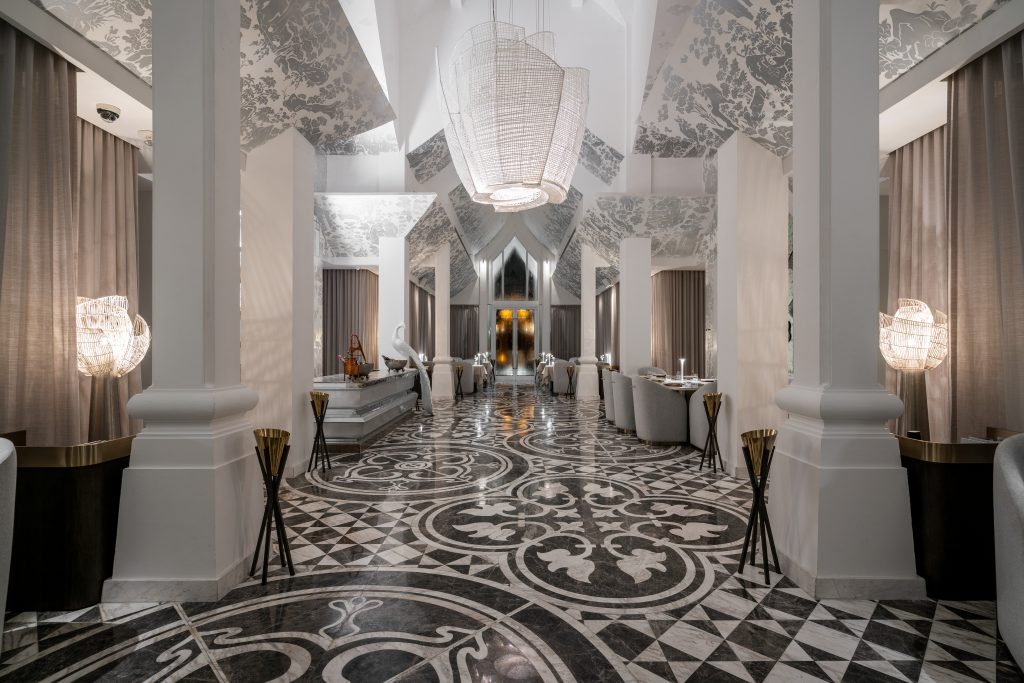
Hom Restaurant at the InterContinental Phuket is one of the latest additions to the island resort, but unlike most restaurants you will find on the island, this innovative eatery that takes its name from the Thai word for ‘fragrance’ focuses on eclectic cuisine styles, fermentation and local ingredients. Headed by Ricardo Nunes who has cut his teeth at Ikoyi, Le Dam de Pic and Gaggan, we speak to the Portuguese native about his cuisine.

So tell us a bit about your background…
It’s been a while ago now, in Portugal, an internship at a restaurant called Belcanto, which is a two Michelin star restaurant. Then I moved to London for some casual places, and then that came to Thailand, worked at Gaggan. Went back to London at Le Dam de Pic for a while and then I joined Ikoyi after Ikoyi, here I am. I also staged at Dinner by Heston Blumenthal.

What is your philosophy when it comes to your cooking style and cuisine?
Produce comes first, especially being a foreigner in Thailand and having all these exotic ingredients that I’ve never seen before. It kind of opens, builds creativity. Everything about the produce.

Is there any specific farms that you work with in Thailand?
Yes, we do. We work with quite a few farms here. Their speciality is goat and they do have stock. Everything is very little because it’s mainly to supply only for Phuket. So everything they grow and farm is in very small quantities. For example, our sea snails, whenever we need it, we ask this guy. He doesn’t have a farm, he just goes and looks for it, like when we need ten, he goes and get us ten.

Is there any specific ingredient that you love using that is from Phuket?
I think most of the seafood is very good. I’ve said it before that if you come with an open mind and if you are here to enjoy, you will not miss all these expensive ingredients that people import. I think if you come to purely enjoy dinner, and then you taste our black grouper and you’re not going to go… I missed turbot.

Of all the chefs that you’ve worked with before, who inspires you the most?
Jeremy Chan (Ikoyi), he’s only 34, 35 maybe. Opened my mind to when I first started at Ikoyi. I remember during my interview, he said, oh, we do things different here, so don’t worry about bringing your knowledge. Basically learn everything from scratch.

How would you define your cuisine style today?
Tricky question. I think I’m very young to have already a fixed style. Still figuring it out as I go. I have a lot of reference points this stage. I have Ikoyi, which is very innovative and creative. I have Le Dam du Pic, which is very French. So I’m trying to combine. I also have Gaggan, which is very molecular. So trying to combine a bit of all this knowledge and make it my own. Still working on my own. Not sure how to describe what is my style. I know what I want the guests to experience, on what Hom is. It’s still tricky because it’s very new. This is my first role as chef de cuisine. I think a year or two I’ll get there.

So if you have to choose between seafood and meat, which do you prefer cooking?
Vegetables. But if there was only these two, I would say seafood, because Portugal is very seafood driven. It would be vegetable, then seafood and then meat.

Can you tell us a bit about your fermentation programs?
Yeah, everything is fermentation driven in this restaurant. We still don’t have a lab or test kitchen or anything like that. So as of right now, we just try to look for what’s interesting to be fermented, see the final result, and then build on that. Black durian, for example. We just grab it, put it in a rice cooker and see what comes out, interesting. So next is what can we do with this now? We still don’t have like, a program that goes on for three months or something. We never know what comes out because whenever worked with these ingredients before. Durian, lotus seeds, banana leaves and banana blossoms, it’s all new for us. It’s hard to say we’re going to do this in six months, because we don’t even know what its going to taste like.

What can guests expect to experience when they come to Hom?
Definitely innovation. We are very good at that. Different flavours kind of breaks what everyone is expecting in terms of food. When they look at Hom, it’s very aesthetic pleasing and people go and expect all these. Foods with 32 ingredients and a lot of detail. We kind of like it to keep it minimalist and focus on flavour. So, if it tastes good, it goes with the concept, it goes on the menu. I think that’s a good definition of strong, bold flavour. A lot of personality.
| PHOTOGTAPHY: INTERCONTINENTAL PHUKET | WEBSITE: HOM RESTAURANT |